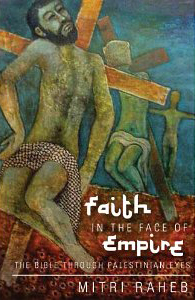Book Notes
 Mitri Raheb, Faith in the Face of Empire; The Bible Through Palestinian Eyes (Maryknoll: Orbis, 2014), 166pp.
Mitri Raheb, Faith in the Face of Empire; The Bible Through Palestinian Eyes (Maryknoll: Orbis, 2014), 166pp.
Mitri Raheb was born in Palestine "across the street" from where Jesus was born in Bethlehem. He's a Palestinian Christian, a Lutheran pastor, and a scholar who earned his doctorate in theology from Marburg University in Germany. He's written thirteen books, edits a journal, serves the synod of the Evangelical Lutheran Church, and helped to found several ecumenical peace organizations. He's also lived through nine wars in his fifty years. All of which lends his book about Palestine an enviable degree of street cred.
Raheb could have written a scholarly monograph, but this is a book written for a general audience that's based upon his personal experiences. He looks at Palestine through a long lens, namely, three thousand years of occupation by numerous regional powers, beginning with the Assyrians, the Babylonians, the Persians, Greeks, Romans, Byzantines, and proceeding up to Israel today. And make no mistake, Israel is an empire-oppressor by proxy as a client state of western powers. His book tries to understand this long view of the Palestinian narrative in a way that's "politically relevant and theologically creative."
Empires control the movement of people, control resources like water, settle the land, use state terror, and exile or deport people. The oppressed subjects of empires resist in all sorts of different ways. They fight back, observe God's laws, accommodate themselves as best they can, collaborate, and separate themselves (cf. Qumran). Raheb doesn't pretend that there are any clear or easy answers to the Palestinian-Israeli conflict. But he's written a provocative book for the people of God, who are called not just to seek peace for Arabs or Jews, Christians or Muslims, but for every person and people.


